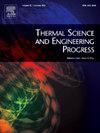多温输送级联热泵系统的解耦控制
IF 5.1
3区 工程技术
Q2 ENERGY & FUELS
引用次数: 0
摘要
多温运输系统可以同时运输不同温度要求的货物。目前,大多数现有系统仅限于冷却或加热隔间,限制了它们在特定货物和环境温度条件下的使用。因此,本研究提出了一种具有三个温控隔间的新型系统架构,利用两个级联蒸汽压缩热泵来实现隔间的节能联合冷却和加热。然而,众所周知,多温度运输系统的控制是具有挑战性的,特别是由于耦合动力学可能导致车厢内不必要的温度偏差,可能导致货物损坏或丢失。为了解决这个问题,我们提出了一种基于反馈线性化的控制策略来解耦系统,允许每个隔间的单独温度控制。研究了该控制概念对模型的未知干扰和参数不确定性的鲁棒性。仿真结果验证了解耦控制的性能和有效性,与不解耦的传统控制方案相比,温度偏差降低了15%。本文章由计算机程序翻译,如有差异,请以英文原文为准。

Decoupling control of a cascaded heat pump system for multi-temperature transport
Multi-temperature transport systems enable the simultaneous transport of goods with different temperature requirements. Currently, most existing systems are limited to either cooling or heating the compartments, restricting their use to specific goods and ambient temperature conditions. Therefore, this work proposes a novel system architecture featuring three temperature-controlled compartments, utilizing two cascaded vapor compression heat pumps to enable energy-efficient combined cooling and heating of the compartments. However, the control of multi-temperature transport systems is known to be challenging, especially due to the coupled dynamics that can cause unwanted temperature deviations in the compartments, potentially leading to damage or loss of goods. To address this issue, we present a control strategy based on feedback linearization to decouple the system, allowing for individual temperature control of each compartment. The robustness of this control concept against unknown disturbances and parameter uncertainties of the model is investigated. Simulation results demonstrate the performance and effectiveness of the decoupling control concept, achieving a 15% reduction in temperature deviations compared with a conventional control scheme without decoupling.
求助全文
通过发布文献求助,成功后即可免费获取论文全文。
去求助
来源期刊

Thermal Science and Engineering Progress
Chemical Engineering-Fluid Flow and Transfer Processes
CiteScore
7.20
自引率
10.40%
发文量
327
审稿时长
41 days
期刊介绍:
Thermal Science and Engineering Progress (TSEP) publishes original, high-quality research articles that span activities ranging from fundamental scientific research and discussion of the more controversial thermodynamic theories, to developments in thermal engineering that are in many instances examples of the way scientists and engineers are addressing the challenges facing a growing population – smart cities and global warming – maximising thermodynamic efficiencies and minimising all heat losses. It is intended that these will be of current relevance and interest to industry, academia and other practitioners. It is evident that many specialised journals in thermal and, to some extent, in fluid disciplines tend to focus on topics that can be classified as fundamental in nature, or are ‘applied’ and near-market. Thermal Science and Engineering Progress will bridge the gap between these two areas, allowing authors to make an easy choice, should they or a journal editor feel that their papers are ‘out of scope’ when considering other journals. The range of topics covered by Thermal Science and Engineering Progress addresses the rapid rate of development being made in thermal transfer processes as they affect traditional fields, and important growth in the topical research areas of aerospace, thermal biological and medical systems, electronics and nano-technologies, renewable energy systems, food production (including agriculture), and the need to minimise man-made thermal impacts on climate change. Review articles on appropriate topics for TSEP are encouraged, although until TSEP is fully established, these will be limited in number. Before submitting such articles, please contact one of the Editors, or a member of the Editorial Advisory Board with an outline of your proposal and your expertise in the area of your review.
 求助内容:
求助内容: 应助结果提醒方式:
应助结果提醒方式:


